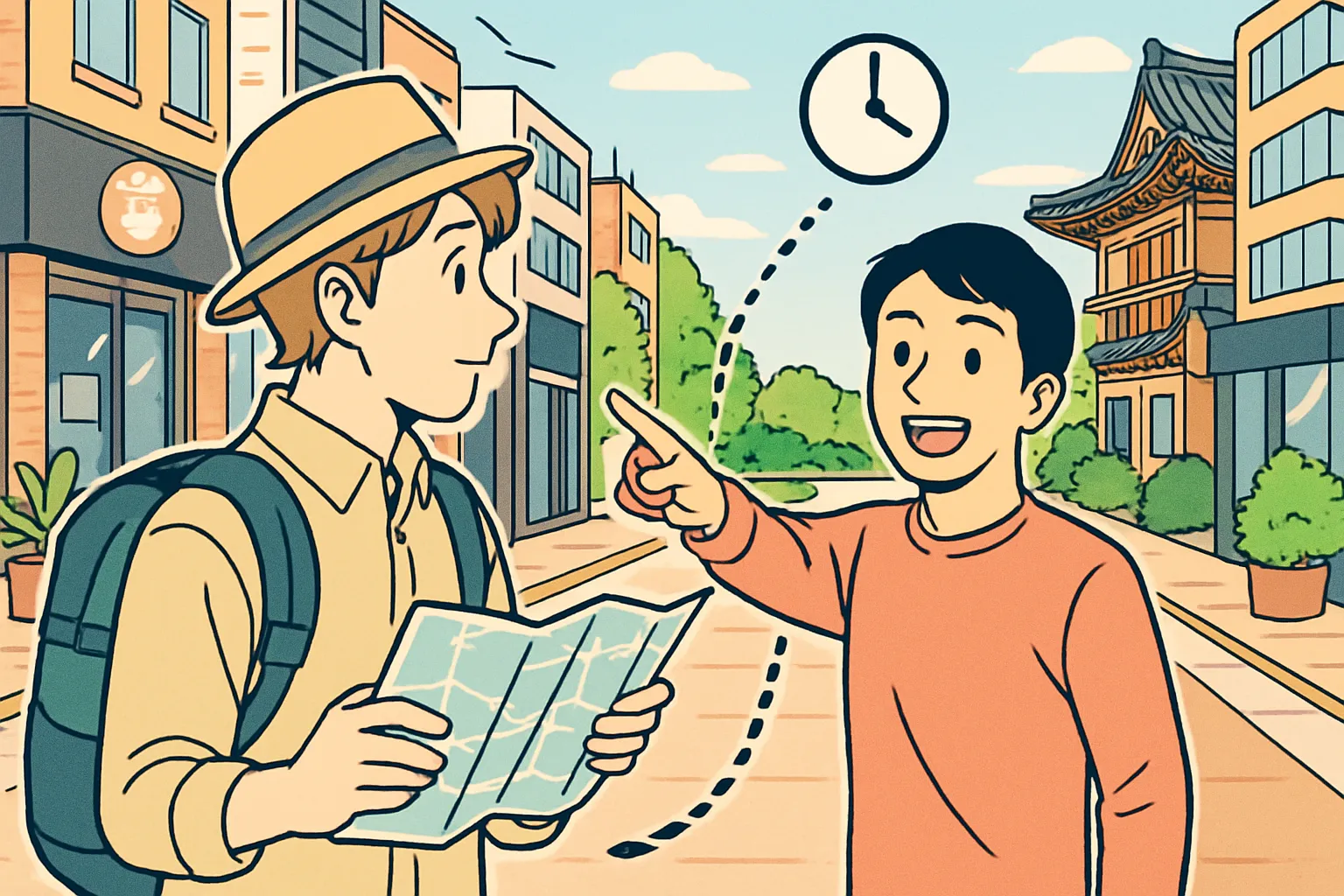Say “Yes” to Your Dream Job & That “Worabel” Life!
Hello! This is Daily Hangul, here to upgrade your Korean skills!
Have you ever dreamed of working in Korea? Or maybe you’ve just received an exciting offer from a Korean company? Today, we’re going to tackle a very important moment: how to professionally and confidently accept a new job offer in Korean.
Lately in Korea, the concept of ‘워라밸’ (worabel), or ‘work-life balance,’ has become a massive trend. The younger generation, in particular, is moving away from the old “work-all-the-time” culture and actively seeking jobs that respect their personal time. So, knowing how to accept an offer while showing you’re in tune with this modern culture is a huge plus! Let’s get you ready to say “Yes!” to your dream career.
Key Expressions You Must Know
Here are the essential phrases you’ll need to sound professional and enthusiastic.
1. 귀사 (gwi-sa)
- Pronunciation: [gwi-sa]
- English Meaning: Your esteemed company
- Detailed Explanation: This is a key word in Korean business etiquette! While
회사(hoe-sa) just means ‘company,’귀사is a highly respectful and formal term used to refer to the company you are speaking to. Using this immediately shows that you understand formal business language. Think of it as the difference between saying “your company” and “your esteemed organization.”
2. 제안을 받아들이다 (je-an-eul bad-a-deul-i-da)
- Pronunciation: [je-an-eul ba-da-deu-ri-da]
- English Meaning: To accept an offer
- Detailed Explanation: This is the core phrase for this situation. It’s a formal and clear way to state your acceptance. Let’s break it down:
제안(je-an) means “offer” or “proposal.”받아들이다(bad-a-deul-i-da) is the verb “to accept.”- When you say it, you’ll often use the formal polite ending: 제안을 받아들이겠습니다 (je-an-eul bad-a-deul-i-gess-seum-ni-da), which means “I will accept the offer.”
3. 함께 일하게 되어 기쁩니다 (ham-kke il-ha-ge doe-eo gi-ppeum-ni-da)
- Pronunciation: [ham-kke il-ha-ge dwe-eo gi-ppeum-ni-da]
- English Meaning: I am happy/pleased to be working with you.
- Detailed Explanation: After accepting, you want to show your excitement! This phrase perfectly expresses your positive feelings about joining the team.
함께(ham-kke) means “together,” and일하게 되어 기쁩니다(il-ha-ge doe-eo gi-ppeum-ni-da) conveys the happiness of the opportunity “to get to work” with them.
4. 최선을 다하겠습니다 (choe-seon-eul da-ha-gess-seum-ni-da)
- Pronunciation: [chwe-seon-eul da-ha-get-seum-ni-da]
- English Meaning: I will do my best.
- Detailed Explanation: This is a powerhouse phrase in Korean work culture. It’s a strong, humble, and determined promise to your new employer. Saying
최선을 다하겠습니다shows your commitment and strong work ethic. It’s a perfect way to end the conversation and leave a great final impression.
Example Dialogue
Let’s see how these expressions work in a real conversation. Imagine you (B) are calling the HR manager (A) to accept a job.
- A (HR Manager): 여보세요, 대한전자 인사팀 박서준입니다.
- Yeoboseyo, Daehan-jeonja insa-tim Park Seo-jun-imnida.
- (Hello, this is Park Seo-jun from the HR team at Daehan Electronics.)
- B (You): 안녕하세요! 이번에 마케팅팀에 지원했던 김유정입니다. 좋은 제안을 주셔서 진심으로 감사합니다.
- Annyeonghaseyo! Ibeon-e maketing-tim-e jiwon-haet-deon Kim Yoo-jung-imnida. Jo-eun je-an-eul ju-syeo-seo jin-sim-euro gamsahamnida.
- (Hello! This is Kim Yoo-jung, who is applying for the marketing team. Thank you so much for the wonderful offer.)
- A (HR Manager): 아, 유정 씨! 연락 주셔서 감사합니다. 저희 제안은 어떠셨나요?
- A, Yoo-jung-ssi! Yeollak ju-syeo-seo gamsahamnida. Jeo-hui je-an-eun eo-tteo-syeon-na-yo?
- (Ah, Ms. Yoo-jung! Thank you for calling. What did you think of our offer?)
- B (You): 네, 신중하게 고민했습니다. 귀사의 제안을 기쁘게 받아들이겠습니다. 앞으로 함께 일하게 되어 기쁩니다!
- Ne, sinjunghage gomin-haetseumnida. Gwi-sa-ui je-an-eul gippeuge bad-a-deul-i-gess-seum-nida. Ap-euro ham-kke il-ha-ge doe-eo gi-ppeum-nida!
- (Yes, I have considered it carefully. I would like to gladly accept your esteemed company’s offer. I’m pleased that I will be working with you!)
- A (HR Manager): 정말 잘 됐네요! 저희도 유정 씨와 함께하게 되어 기쁩니다. 환영합니다!
- Jeongmal jal dwaetneyo! Jeo-huido Yoo-jung-ssi-wa hamkkehage doe-eo gippeumnida. Hwanyonghamnida!
- (That’s great news! We are also very happy to have you with us, Ms. Yoo-jung. Welcome!)
- B (You): 감사합니다! 입사해서 최선을 다하겠습니다!
- Gamsahamnida! Ipsa-haeseo choe-seon-eul da-ha-gess-seum-nida!
- (Thank you! I will do my best after I join the company!)
Culture Tip & Trend Deep Dive: The Age of ‘Worabel’ (워라밸)
As we mentioned, ‘워라밸’ (worabel) is a huge deal in Korea right now. It’s a Konglish (Korean-style English) word that comes from “Work-Life Balance.”
For a long time, Korean work culture was famous for long hours and a hierarchical structure. But the MZ Generation (Millennials + Gen Z) is changing the game. They value personal growth, hobbies, and time with family and friends just as much as their careers.
So, what does this mean for you?
- It’s okay to value your time: When discussing a job, showing that you appreciate a company’s efforts to provide good ‘worabel’ is seen as a positive. It shows you’re up-to-date with modern Korean societal values.
- A new selling point for companies: You’ll see many startups and modern companies in Korea, like those often seen in K-dramas like Start-Up or Search: WWW, actively promoting their great ‘worabel’ to attract top talent.
- Sound like a local: Casually mentioning that a company’s ‘worabel’ influenced your decision makes you sound much more culturally fluent!
Let’s Practice!
Great job today! You’ve learned some incredibly useful and professional Korean phrases. Now, let’s put them to the test.
- Fill in the blank: You are writing an email to accept a job offer from a company called “한글 테크 (Hangul Tech)”. How would you formally refer to the company?
네, (______________)의 제안을 기쁘게 받아들이겠습니다.
(Yes, I would be happy to accept the offer from your esteemed company.) - Make a sentence: How would you express your commitment to work hard at your new job using one of today’s key phrases?
You’re now ready to accept that dream job offer with confidence and style!
Leave a comment below using one of the expressions we learned today! We can’t wait to see you try them out. 화이팅 (Hwaiting)






